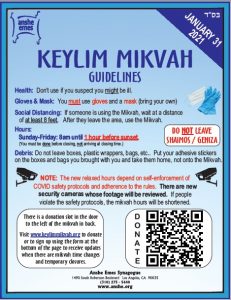PARSHA MATOS
I. Summary
A. Vows to Hashem. A vow (either positive [e.g., to give charity] or negative [e.g., to abstain from a certain act]) was binding. A vow could be annulled in certain limited circumstances.
B. Attack on the Midianites. 12,000 Israelite warriors (i.e., 1,000 from each tribe), accompanied by Pinchas, attacked the Midianites, slaying every male Midianite (including Bilam and the five kings of Midian). The women, children, cattle and other possessions of the Midianites were taken as spoils, although Moshe reprimanded them for keeping the women (who were the cause of the plague on the Jews) alive. The soldiers, unclean by contact with the dead, were required to stay outside the camp for seven days to undergo a purification ceremony. All of their garments and utensils were cleansed per Elazar’s instructions. Spoils were divided equally between the warriors on the one hand, and entire congregation on the other hand. The soldiers contributed 1/50th of their spoils to the Levi’im and, thankful that they didn’t suffer even one casualty, made an additional free-will offering to the Mishkon.
C. Reuven and Gad’s Request. The tribes of Reuven and Gad, who had large herds of cattle, asked permission to settle in the pasture land of Gilad (on the east of the Jordan). Moshe at first disapproved of this plan, fearing that the other tribes might lose heart if these two tribes stayed behind during the conquest of Canaan. However, when Reuven and Gad promised that they intended to join the fight while their families remained in Gilad, Moshe agreed (charging Yehoshua with making sure that they kept their promise, failing which they would forfeit any claim to settle in Gilad).
II. Divrei Torah
A. Lil’Mode Ulilamed (Rabbi Mordechai Katz)
1. Keeping your word. The Parsha discusses the laws of vows respecting voluntary service to Hashem or one’s fellow man. Koheles teaches that “it is better for one not to vow at all than for him to vow and then not fulfill”. This certainly has practical application — if we make a promise to Hashem or to another person, we must be careful not to go back on our own word. The same is equally true of pledges we make to ourselves.
2. Priorities. When Reuven and Gad assured Moshe that they would join the battle to conquer Canaan, they told him “we’ll build sheepfolds for our cattle and cities for our children here, but we will be armed to go before the Children of Israel until we have brought them to their place”. While Moshe was pleased with their intention to join the other tribes in battle, he saw disturbing signs in their priorities — they mentioned the building of homes for their cattle before homes for their children. Thus, Moshe instructed them to “build your cities for your little ones, and [then] folds for your sheep”, reminding them that the well-being of one’s children must come before the well-being of one’s material possessions.
B. Peninim on the Torah (Rabbi A.L. Scheinbaum)
Priorities. As noted above, the material desires of the tribes of Reuven and Gad (i.e., to reside in the pasture land of Gilad) led them to be the first tribes to be exiled. We must be careful not to place our material pursuits above Torah, Torah education and our families.
C. Growth Through Torah (Rabbi Zelig Pliskin)
Your good deeds are an everlasting spiritual monument. “And Novach captured Kenas and its surrounding villages and he called it Novach after his name”. Rashi cites Rabbi Moshe Hadarshan that this means that Novach’s name didn’t last. Rabbi Samson Raphael Hirsh said that this teaches us an important principle — monuments of statutes and buildings named after a person can be modified or destroyed; however, good deeds and spiritual attainments are true everlasting monuments. (It is interesting to note that the souls of the deceased still come before the “Beis Din” to be judged. On what basis can souls be subject to judgment?! They are judged for and by the mitzvos and good deeds done by their descendants — this is one’s true “legacy”.)
D. Living Each Week (Rabbi Abraham Twerski)
The Importance of Speech. Although this Parsha specifically addresses vows, the Torah commentaries have broadened this concept to apply to everything that one says. Torah places great emphasis on words. Verbal blessings are considered important, and the Talmud states that not only is there great value to a Tzaddik’s blessing, but also to an ordinary person’s blessing. One should not utter curses, and be careful not to say ominous words about oneself. Verbal communication is a prominent difference between man and lower forms of life. This special gift to mankind should not be treated lightly. Many volumes have been written about shmiras halashon (guarding one’s tongue). In our daily prayers, we say “My G-d, prevent my tongue from speaking evil and my lips from uttering deceit. As with all other prayers for Divine assistance, we must first exert our own efforts (in this case, to guard our tongues).
E. Reflections on the Sedra (Rabbi Zalman Posner)
Caring for others. When several tribes approached Moshe for permission to stay in trans-Jordan, he retorted, “Your brothers go into battle and you will sit here?” Here a familiar integral theme of Torah recurs. Anyone living in comfort and security finds it difficult to realize the situation of those in want and peril. We may read of famines in Africa and sympathetically nod, but undismayed we turn to the next item in the newspaper and with little appreciable loss of appetite sit down for dinner. Only a person of responsibility to mankind and with rare compassion will be moved enough to share the troubles of the unfortunate. With Israel especially, one Jew’s peril is every Jew’s concern. No Jew anywhere in the world can hide from problems plaguing other Jews.




 Visit the group and request to join.
Visit the group and request to join.
